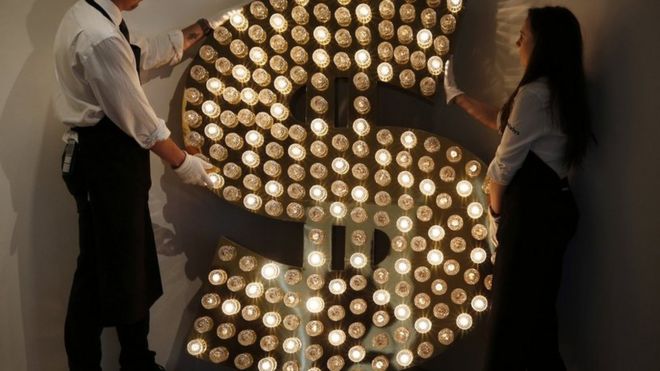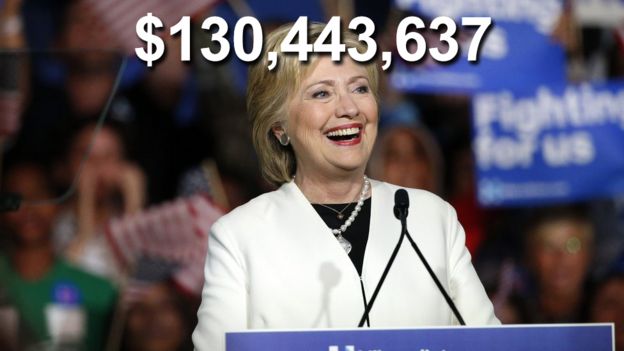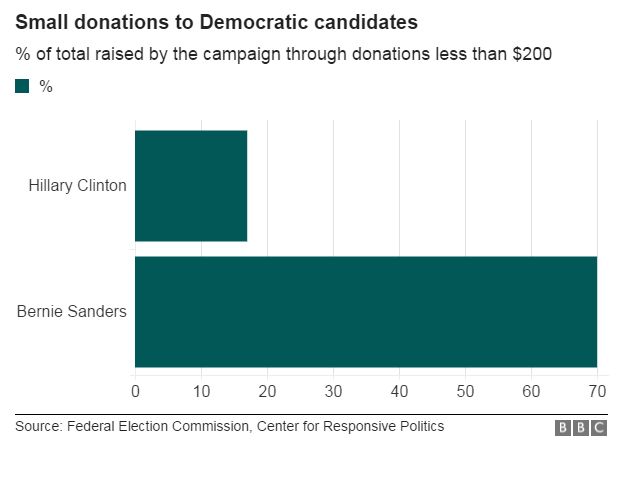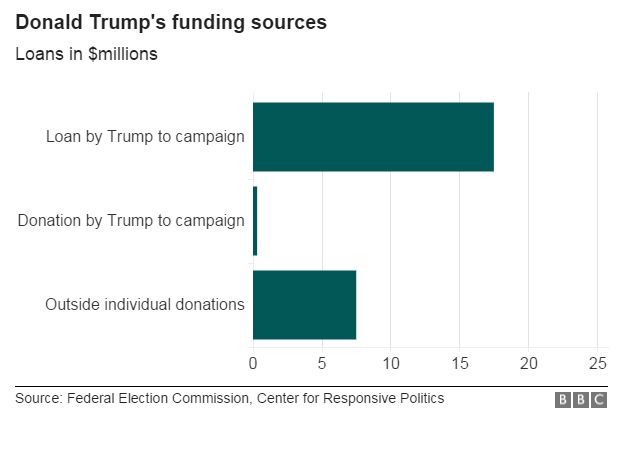
The role of money has become an issue all its own in this election cycle. Bernie Sanders has called for an end to big money in politics while billionaire Donald Trump is using his own wealth to fund part of his campaign.
US federal election law requires all candidates to report each campaign donation to the Federal Election Committee (FEC). These filings offer insight into who is willing to put their money where their vote is.
These reports do not include the large sums going to independent-expenditure only committees (super PACs) and other party and outside group spending. Super PACs must maintain a separation from the campaign.
Direct campaign donors are legally allowed to interact with a candidate, but their donations cannot exceed $2,700 per presidential candidate.
So who is using their cash to possibly bend the ear of the future president? A look at the campaigns' donors gives a surprising view on the election.
Hillary Clinton - Total raised $130,443,637 (£91,761,306)

There have been few candidates more criticised for where their campaign contributions come from than former Secretary of State Hillary Clinton. With Bernie Sanders continually questioning the influence of Wall Street on politics, her ties to big banks have been a liability.
Though she has received a significant amount from bankers, she has raised even more from lawyers.
The Clinton campaign has taken in $11m from lawyers and law firms, including $1.33m from individuals who work at seven of the top US law firms. By contrast she has received just over $4m from the commercial banking and investment industries.

Many of the lawyers donating to Secretary Clinton's campaign represent big corporations and banks as well as "shadow banking" organisations - hedge funds, mutual funds, and limited liability companies.
This area of finance has grown significantly since the financial crisis. They have positioned themselves as alternative lenders compared to banks and have used their growing pots of money to donate to several candidate, not just Mrs Clinton.
But Mrs Clinton is one of the few candidates who has addressed the role of "shadow banking" in the financial system and the need to regulate it. She has even said shadow banking could lead to the next financial crisis.
If she is elected those organisations may need a lot more lawyers to help them cope with increased regulations and the government would like call on outside counsel to write them.
Bernie Sanders - Total raised $96,311,423 (£67,749,575)
Bernie Sanders has not shied away from criticising Wall Street, calling out big corporate donors and condemning super PACs - ostensibly cutting off traditional places for campaign fundraising. He even returned a donation from the former chief executive of Turing Pharmaceutical, Martin Shkreli, who notoriously raised the price of one drug by 5,000%.
Instead he has received a swell of financial support from Americans giving in small amounts.
Nearly three-quarters of Senator Sanders' donations have been under $200. His campaign said the average donation in 2015 was $27.16. Only 17% of donations to rival Hillary Clinton are under $200.
Senator Sanders' has also managed to tap an unexpected group of Americans for donations - the unemployed. In 2015 his campaign raised $14m in donations from people without jobs.
Part of Senator Sanders' populous appeal is his criticism of the campaign finance system and the role of super PACs. Sanders' campaign has said, "He doesn't have a super PAC. He believes you can't fix a rigged economy by taking part in the corrupt campaign finance system in which politicians take unlimited sums of money from Wall Street and other powerful special interests and then pretend it doesn't influence them."
But there is a registered super PAC supporting Sanders' however, formed by the National Nurses United - the largest union of nurses in the US. The group has raised $2.3m though from small donors, millionaires.
Ted Cruz - Total raised $54,661,506 (£38,458,710)
Following Super Tuesday Ted Cruz has tried to position himself as the only man who can beat Mr Trump, but he has been ahead in fundraising since the start.
More than most, Texas Senator Ted Cruz has relied on donations from his home state. His campaign has received 43% of its donations from people in Texas. Those donations came from a wide range of industries including traditional Texas businesses like oil and gas and farming.
Among his largest donors are the Wilks Brothers - Dan and Farris. The brothers founded a hydraulic fracking business - Frac Tech - and took advantage of the Texas energy boom before selling the company in 2011. The pair has since focused their attention on buying land in the western US.
They have given his campaign $59,050, but have also donated $15m to a super PAC supporting Mr Cruz.
One of the most striking features on the list of top contributors to Senator Cruz's campaign is the US postal service. The donations come from individuals who work for the postal service not the federal organisation, but with $34,345 in donations it seems the Texas Senator has struck a chord with US mail carriers.
Donald Trump - Total raised $25,526,319 (£17,959,550)
Like Bernie Sanders, billionaire businessman Donald Trump's populous appeal has helped drive campaign donations. He has had a few advantages, though.
The first was the amount of media attention Mr Trump received early on allowing him to spend his campaign message without buying costly TV ads.
That has not stopped him from fundraising. The campaign has raised $25m, but only $7.5m is from individual donors. Health professionals and real estate professionals are the most active donors.
Mr Trump's second advantage, his ability to self-fund, has helped him raise the rest.
Importantly most of his self-funding is a loan; 69% of the campaign's funding is debt that has to be paid back either using other donations or by the candidate himself. Mr Trump has so far only spent $250,318 of his money on his presidential bid.

Most of the Trump campaign's individual's donors are small, demonstrating his grassroots appeal.
One of his donors liked Mr Trump's "Make America great again" slogan so much he applied for a trademark for "Make Christianity great again". Another listed his job title as "#1 Trump fan".
John Kasich- Total raised $8,648,890 (£6,083,793)
As the Governor of Ohio and a former nine-term congressman, investment banker and Fox News commentator, it would seem like John Kasich would have a lot of potential donors to call on for his presidential run.
In fact a whopping 86% of his donations are from large individual contributions that have given, in total, over $7.4m.
Billionaires including hedge fund manager Stanley Druckenmiller and investor Ron Burkle have thrown their support behind Governor Kasich. The industries he has received the most donations from are law firms, real estate and financial investments.
But his campaign still trails his rivals in terms of financial support, highlighting the biggest trend of 2016 election - traditional sources and establishment politics are not the biggest draw.
Marco Rubio (dropped out) - Total raised $34,652,654 (£24,379,915)
After a loss in his home state of Florida, Marco Rubio has suspended his campaign, but his fundraising numbered among the largest pots of Republican money this election cycle.
After Jeb Bush dropped out of the race, Rubio - his former protege - was a big benefactor of political donations that needed a new home. Even before Mr Bush officially dropped out several of his top donors has migrated to the Florida senator's campaign.
But being the establishment candidate means much of his donations come from large corporate donors that have been the target of campaign attacks. Only 19% of Senator Rubio's donations are from small donors, the only Republican candidate with a lower percentage of small donors is John Kasich.
The seven of the top 10 organisations that Marco Rubio has received donations from are banks, money management firms and insurance companies including Goldman Sachs, Morgan Stanley and Elliott Management.
In his campaign's FEC filing over 1,000 donations came from individuals listing their job title as chief executive officer.
Senator Rubio is also the only Republican apart from Donald Trump whose campaign has taken out a loan for financing, though just $98,000.
Numbers that surprise
Retired people make up the biggest group of donors for all candidates, but some stack up better than others. Hillary Clinton leads the pack. Her campaign has raised $12.8m from retired people, followed by Ben Carson with $9m, Ted Cruz with $7.8m.
Donald Trump has the least from retired people among the candidates - $432,143.
Bernie Sanders has a lead in raising money from yoga instructors over Hillary Clinton. He has received 209 donations from yoga teachers to Secretary Clinton's 73.
And Mr Trump has talked openly about donations he gave in the past to politicians including Republican rival Ted Cruz ($5,000) and Democrat Hillary Clinton ($700).



No comments:
Post a Comment